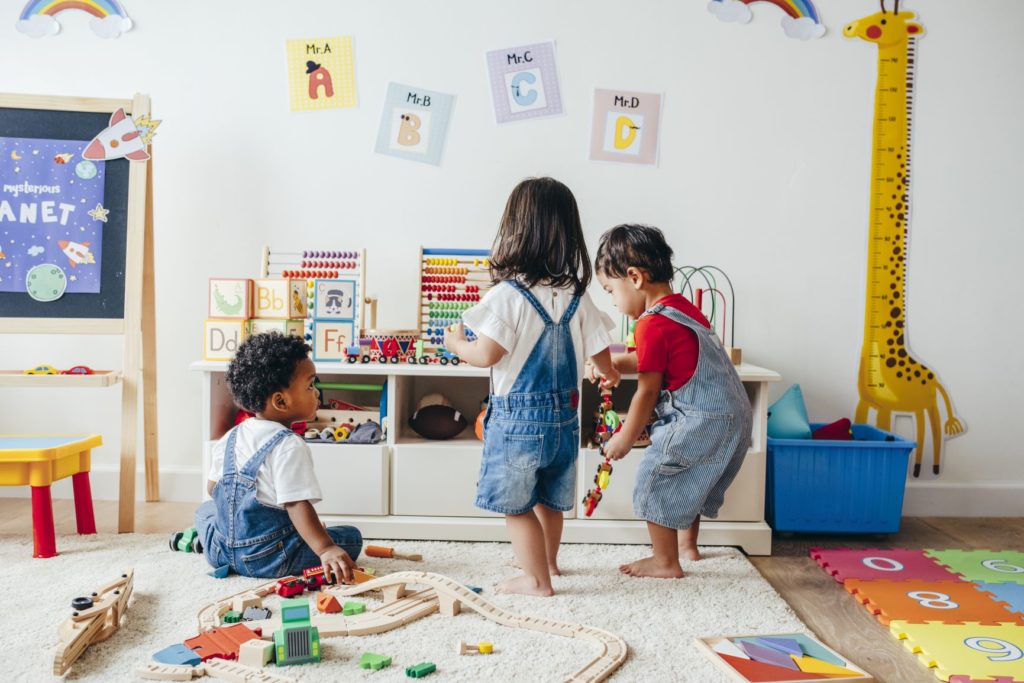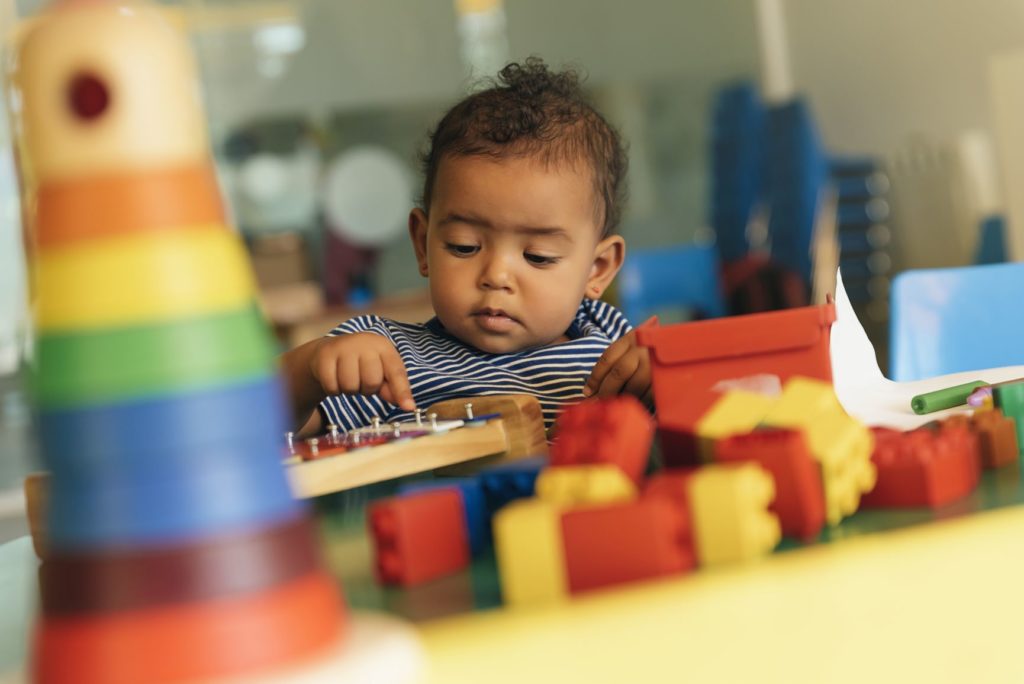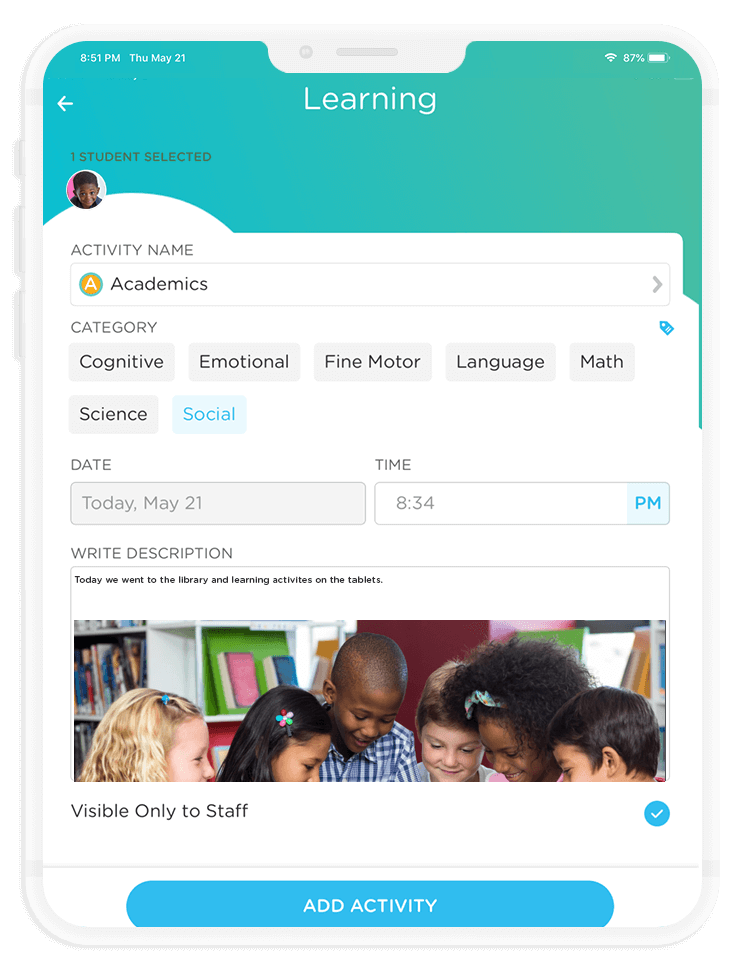
What’s your favorite childhood memory? A family vacation perhaps? The day you got your first puppy? Maybe it’s the time you took first place at your school’s science fair.
For many of us, our favorite childhood memory is a time of simple free play. Building forts in the backyard with our siblings. Riding bikes with the neighbor kids. Doing arts and crafts with mom for an entire afternoon.
These times of play make for great memories, don’t they? But they do more for kids than just give them something to look back on. They’re crucial to early childhood development.
In this article we’ll look at the importance of play and why you should make time in your child care schedule for kids to create, imagine and interact with each other.
3 Forms of Play
It’s important to realize that kids play differently depending on their age and disposition. So before we discuss the importance of play, let’s talk about three of its forms:
- Independent Play: As the name suggests, independent play happens when children play by themselves. A child who acts out scenes with his action figures, completes a puzzle or builds a block tower alone is participating in independent play.
- Guided Play: Guided play happens when children play within adult-defined parameters. If you tell your kids to build a house out of Legos, then ask them how many rooms the house should have, you’re helping them participate in guided play.
- Social Play: Lastly, we have social play, which happens when children play with others. A friendly game of basketball in the driveway, acting out make-believe scenarios together and wrestling each count as social play.
All three forms of play are important for child development. The key is to make sure that the kids you care for get the form they need during playtime. We’ll cover this in detail below.
The Benefits of Play

As it turns out, play, whether it’s independent, guided or social, is incredibly beneficial to children. Studies show that play helps kids develop cognitive skills, physical abilities and social skills. It can also help them work through emotions.
Let’s take a closer look at each of these benefits:
Cognitive Skills
Play helps kids, from young childhood to older children, determine their place in the world.
It also helps them develop critical thinking skills and understand cause and effect, while allowing them to explore, use their creativity and satisfy their curiosity.
These are all essential skills that adults use every day. It’s not a stretch to say that by giving your daycare center kids ample playtime, you’re helping provide them the skills they need to one day exist and even thrive, in the real world.
Physical Abilities
Not everyone enjoys sports, but you can’t deny that physical activity, in some form, is important—especially for children who still need to develop strength, balance and reflexes.
Active play such as racing down hills, swimming in the pool, playing organized sports and climbing on play structures should be incorporated into your daycare schedule.
This will allow your kids to improve their fine and gross motor skills, gain an understanding of spatial relations, improve their dexterity and boost their stamina. As an added bonus, free play often wears children out, which can make them easier to manage.
Social Skills
It’s difficult to succeed in life without social skills. Think about it: as an adult, you deal with people on a daily basis, from the parents of the children you watch to the bagger at your local grocery store to the insurance agent on the other end of the phone.
Humans begin to develop social skills as children, and one of the best ways to ensure kids learn them effectively is to let them play with other kids their age.
When children play together, they learn to share, listen to others and compromise with them, and gain an understanding of important social expectations.
Emotional Development
Last, but certainly not least, play helps children learn to process their emotions.
How does a child react when they lose a game? They probably feel sadness, maybe anger. How about when they win? They most likely feel happiness and a boost in confidence. There are good ways and bad ways to handle these emotions.
Play gives kids the experience they need to work through their emotions in healthy ways.
Are There Downsides to Not Playing?
Absolutely. Studies show that a lack of play can lead to a lifetime of negative side-effects.
For example, children who don’t have the opportunity to play outside on a regular basis develop attention and behavior problems more often than those who do.
Additionally, not enough playtime can stunt a child’s imagination, prevent them from learning social skills that will allow them to succeed later in life, affect their emotional development in a negative way and even increase their stress levels.
The importance of play can’t be understated. It’s one of the main ways that children learn and grow. Without it, they might not develop properly.
How to Prioritize Play

If play is so important, how do you make sure the children you care for get enough playtime? Simple: you add play to your daycare schedule. Just make sure your kids are playing the right way. Here are a few suggestions for various age groups:
Babies
You can’t play with babies can you? While it’s true that playtime with a six-month-old will look very different from playtime with a four-year-old, babies still need to play.
Games like peekaboo teach infants about object permanence, i.e. the fact that objects exist even if we can’t see, hear or touch them. Babies also enjoy making noise, which means rattles and crinkly paper are great playtime options.
And don’t forget about talking to the babies you care for. Conversations with infants, one-sided as they may be, also count as play and help them develop communication skills.
Toddlers
The older kids get, the more play options become available to them.
If you look after toddlers, make sure your child care center is stocked with bright colored objects like balls and blocks, age-appropriate books and puzzles, and simple art supplies like crayons, washable markers and plenty of sheets of paper.
When playing with toddlers, encourage them to use their imaginations. This can be done by acting out scenes with dolls and/or action figures, dressing up in costumes, etc.
Reading is also an important part of toddler playtime. Books will help your children develop mentally and form a better understanding of the world around them.
Preschoolers
What’s one of the defining characteristics of preschoolers? Their desire for independence.
Preschoolers want to choose their own clothes and put them on by themselves, decide who they’ll play with at recess and what game they’ll play, climb to the top of the jungle gym unassisted, etc.
It’s important to foster this independence within reasonable limits. For example, you can begin to introduce solo games and activities to the preschoolers you care for such as magnetic tiles, Duplos, tower-building and art exercises.
While independence should be encouraged, it’s also important for preschoolers to socialize. Make sure kids in this age group play with each other, too. Games like tag, red light/green light and Simon Says are perfect for preschoolers.
School-Age Kids
Age doesn’t diminish the importance of play. Sixth graders need playtime, just as much as young children do. The only difference will be the activities they engage in.
For example, school-age kids often enjoy playing with Legos, engaging in sports and other physical activities, learning instruments and playing video games. Yes, video games count as play, but we suggest limiting the amount of screen time your kids have on a daily basis.
It’s important to remember that school-age kids are much more independent than younger children. Because of this, kids in elementary school and above should be allowed to choose their own activities for playtime, within reason, of course.
Make Time for Play

The importance of play is a proven fact. Kids who don’t get enough playtime are less likely to develop the cognitive, physical and social skills they need to succeed in life.
As a child care provider, it’s your job to make sure the kids you watch are playing on a regular basis. Not only that, you need to ensure they’re playing the right way. Fortunately, after reading this article, you have the knowledge you need to foster play at every age!
To help you manage playtime activities, lesson planning and all the other things that come with running a child care center, consider child care management software. With Procare’s modern and innovative software, you can tackle all your administrative challenges like billing, payroll, attendance, contactless check-in and more — giving you time back in your day to focus on the reason you got into this industry in the first place: to provide incredible learning and growth opportunities to the children in your care.
Request a demo of Procare and experience the power of our solution for yourself.



